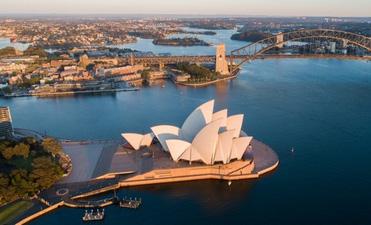
5 minute read
Tariff turmoil, trade triumph Australia must seize the moment
From the editor’s desk
As protectionism rises across major economies, Australia finds itself at a crossroads—and with a rare chance to lead. The latest wave of U.S.-led tariffs has stirred unease in global markets, threatening the foundations of free trade. But where others see a crisis, Australia can find opportunity.
Economist Warwick McKibbin recently noted that Australia is perhaps in the best position of any country to turn the global tariff disruption to its advantage. And he’s right. Australia is not only geographically removed from the epicenter of tariff conflicts, but economically wellpositioned, politically stable, and diplomatically credible. This is a moment that demands bold trade policy—not caution.
The case for acting decisively is strong. According to the Productivity Commission, eliminating Australia’s remaining trade barriers could save businesses nearly AUD 4 billion annually in compliance and regulatory costs. That’s money that could be redirected into growing small and medium enterprises, boosting exports, and making Australian goods and services more globally competitive. In an era of rising living costs and inflation anxiety, anything that helps reduce costs and widen access is worth serious attention.
But the issue here is not just about savings. It’s about strategy. As traditional trade alliances become unpredictable—thanks to the inward turn of giants like the U.S. and China—Australia must step into the vacuum. The world needs reliable partners, and Australia’s open economy, transparent legal system, and world-class products make it a natural fit.
Trade negotiations with the European Union are already being revived after previously stalling in 2023. This is a smart move. If successful, a free trade agreement with the EU would not only open new markets for Australian wine, meat, and services—it would also affirm Australia’s role as a proactive, rules-based trading nation in a time of volatility. The opportunity is not just to export goods, but to export trust.
However, Europe should not be the only focus. Diversifying Australia’s trade relationships beyond its traditional partners is crucial. Southeast Asia, India, Latin America, and Africa offer growing consumer markets and untapped potential for cooperation. These regions are eager to work with dependable partners—and Australia must step forward.
Australia has more than exports to offer. Clean energy expertise, high-quality education, agritech, digital services, and advanced manufacturing—all of these are assets that partner countries are actively seeking. Trade agreements must not only reduce tariffs but also facilitate knowledge-sharing, technology partnerships, and co-investment in sustainable industries.
Meanwhile, at home, it’s time to clean up what remains of the country’s own trade barriers. Though tariff levels are low, even modest obstacles—like outdated red tape or duplicative regulations—hurt Australia’s competitiveness and slow innovation. Removing these barriers sends a clear message: Australia is not just calling for global openness—it is willing to walk the talk.
But this won’t be easy. Protectionist sentiments still exist domestically, and some industries will fear that increased openness means exposure to cheaper imports or more competition. The government must address these concerns not with retreat, but with robust transition plans. Industryspecific support, innovation grants, workforce upskilling, and regional development funds can help struggling sectors adapt and thrive in a liberalised trade environment.
This moment is not just about economics. Trade policy today intersects with foreign policy, climate strategy, and national security. When Australia signs a trade agreement, it strengthens not just its GDP but also its global influence. Trade becomes a diplomatic tool—linking countries through mutual interests and reducing the likelihood of conflict.
For instance, the Indo-Pacific region is emerging as the focal point of global economic activity. By strengthening trade ties with countries like India, Indonesia, Vietnam, and the Philippines, Australia can help shape a peaceful, prosperous regional order. Australia’s participation in the Quad and ASEAN dialogues already gives it a platform—now it must follow through with practical trade initiatives that reflect shared values and vision. There is also a cultural dividend. Trade brings people together— not only business leaders and politicians but students, tourists, workers, and creatives. Strong trade ties foster curiosity, mutual respect, and real relationships. Australia’s multiculturalism, including a large and dynamic diaspora population, becomes a strength here. It allows the country to build bridges where others are building barriers. Furthermore, Australia’s leadership in green technologies and sustainable practices could become a major export in itself. As the world confronts climate change, countries are seeking eco-friendly solutions. Australia can and should position itself as a provider of green infrastructure, energy solutions, and sustainable agriculture. A trade policy that prioritises green exports is not just economically sound—it’s morally right.
Of course, none of this is guaranteed. The global economy remains fragile, and populist pressures can derail even the best of intentions. But waiting for perfect conditions is not leadership—it’s passivity. Australia must shape the trade landscape proactively, not just react to the moves of bigger powers.
If Australia hesitates, others will fill the gap. If it lowers its ambition, it will lose not just trade opportunities but credibility. The world is watching closely to see who will lead the next wave of global cooperation. If Australia takes bold steps now—cutting its own barriers, pushing forward with EU and Asian trade deals, and deepening ties with emerging economies—it can not only secure economic benefits, but shape the future of global trade itself.
In this moment of tariff turmoil, Australia has a chance to show what real leadership looks like: clear-eyed, confident, cooperative. This is not just about profit margins and commodity exports—it’s about setting a course for national prosperity, regional stability, and global engagement in an uncertain age. The window is open, but it won’t stay open forever. The world needs countries willing to stand for openness, fairness, and longterm thinking. Australia is ready. Now it must act.










